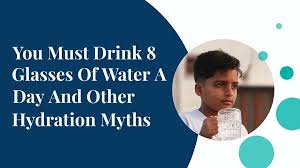Staying hydrated is essential for overall health, but do we really need to drink eight glasses of water a day? This age-old advice has been passed down for generations, yet many people still wonder if it’s based on science or simply a myth. In this article, we’ll dive deep into the science of hydration, explore individual water needs, and provide actionable tips for maintaining optimal hydration levels.
The Origin of the “8 Glasses a Day” Rule
The “8 glasses of water a day” guideline is widely believed to have originated from a 1945 recommendation by the U.S. Food and Nutrition Board. However, the original guidance stated that people need about 2.5 liters (roughly 8-10 glasses) of water daily from all sources, including food and beverages—not just drinking water.
This critical detail is often overlooked, leading to the misconception that we need to drink eight glasses of plain water daily, regardless of other factors.
Hydration Basics: Why Water Matters
Water is the foundation of life. It plays a crucial role in:
- Regulating Body Temperature: Sweating helps cool the body, especially during exercise or in hot environments.
- Supporting Digestion: Water aids in breaking down food and absorbing nutrients.
- Lubricating Joints: Proper hydration reduces friction and discomfort in joints.
- Removing Waste: Water facilitates kidney function and eliminates toxins through urine.
Without adequate hydration, the body struggles to perform these functions, leading to dehydration and associated health risks.
How Much Water Do You Really Need?
The amount of water a person needs varies significantly based on factors such as age, gender, activity level, and climate. Here’s what science tells us:
General Guidelines
- Women: Around 2.7 liters (91 ounces) per day from all sources.
- Men: About 3.7 liters (125 ounces) per day from all sources.
Factors Influencing Hydration Needs
- Physical Activity: Increased activity levels lead to higher water loss through sweat.
- Environment: Hot or humid climates require more water intake to prevent dehydration.
- Health Conditions: Illnesses such as fever, diarrhea, or urinary tract infections increase water needs.
- Pregnancy and Breastfeeding: Women in these stages need additional fluids to support their own and their baby’s needs.
The Role of Food in Hydration
Water isn’t the only source of hydration. Many foods contain high water content and contribute to your daily intake. Examples include:
- Fruits: Watermelon, oranges, strawberries, and cucumbers.
- Vegetables: Lettuce, celery, spinach, and zucchini.
- Soups and Broths: Provide both hydration and electrolytes.
Incorporating these foods into your diet can help you stay hydrated without relying solely on drinking water.
Signs of Dehydration and Overhydration
Symptoms of Dehydration
- Dry mouth and skin
- Fatigue
- Dark yellow urine
- Dizziness or lightheadedness
- Headaches
Risks of Overhydration
While rare, drinking excessive amounts of water can lead to a condition called hyponatremia, where sodium levels in the blood drop dangerously low. Symptoms include nausea, confusion, and in severe cases, seizures.
How to Maintain Optimal Hydration
- Listen to Your Body: Thirst is your body’s natural indicator of hydration needs.
- Monitor Urine Color: Pale yellow indicates proper hydration, while dark yellow signals a need for more fluids.
- Set Reminders: Use apps or alarms to encourage regular water intake, especially during busy days.
- Balance Electrolytes: During intense physical activity, replenish electrolytes with sports drinks or natural alternatives like coconut water.
- Drink Strategically: Start your day with a glass of water and drink more during meals and exercise.
Debunking Common Hydration Myths
Myth 1: Caffeine Causes Dehydration
Moderate coffee or tea consumption doesn’t dehydrate you. In fact, they can contribute to your daily fluid intake.
Myth 2: You’re Always Dehydrated If You’re Thirsty
Thirst is a normal signal, not necessarily an emergency. Drink water gradually to satisfy your body’s needs.
Myth 3: Everyone Needs 8 Glasses of Water a Day
As mentioned earlier, individual hydration needs vary widely. Rigid adherence to this rule may not suit everyone.
Discover the science behind the “8 glasses of water a day” rule. Learn how much water you really need, tips for staying hydrated, and common hydration myths debunked.
The “8 glasses of water a day” guideline is a useful starting point but not a one-size-fits-all rule. Individual hydration needs depend on a variety of factors, including activity level, environment, and health status. By understanding your body’s signals and incorporating water-rich foods, you can maintain optimal hydration and support your overall health.
FAQs About Hydration
1. Can I count coffee and tea toward my daily water intake?
Yes, beverages like coffee and tea contribute to your hydration, although water should remain your primary source of fluids.
2. How do I know if I’m drinking too much water?
Signs of overhydration include nausea, swelling, and confusion. Monitoring your urine color and listening to your body can help prevent this.
3. Do I need sports drinks to stay hydrated during exercise?
For moderate activity, water is sufficient. For intense or prolonged exercise, a sports drink can help replenish electrolytes.
4. Can I hydrate solely through food?
While water-rich foods contribute to hydration, they should complement—not replace—your daily water intake.
5. Is thirst a reliable indicator of hydration?
Yes, thirst is a good indicator for most people, but certain groups (e.g., older adults) may need to be more proactive about drinking water.
By following science-backed advice, you can tailor your hydration habits to your unique lifestyle and enjoy the benefits of a well-hydrated body.